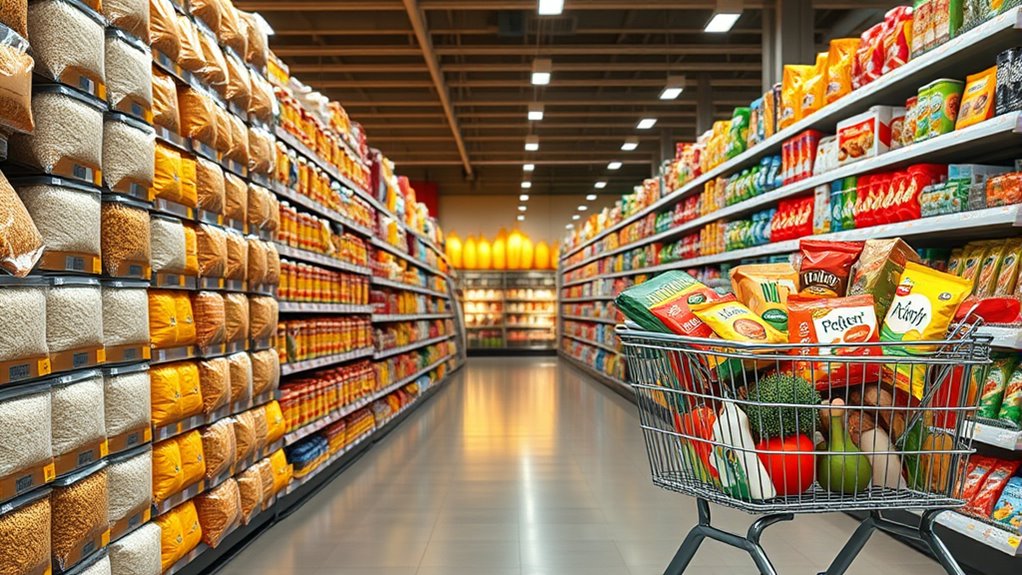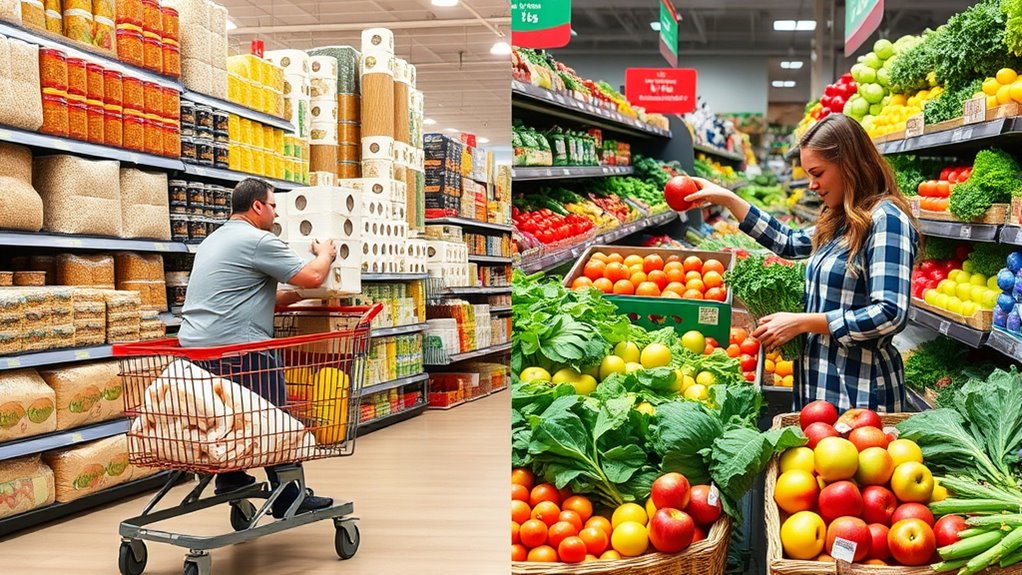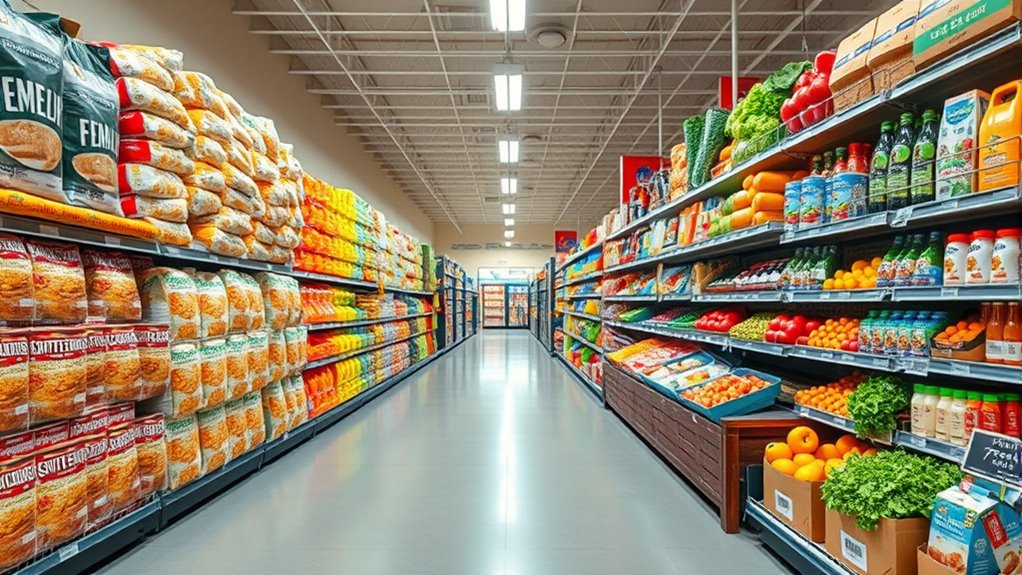Bulk buying can save you up to 10% on your food expenses thanks to discounts on non-perishable items, but weekly shopping offers fresher products and more flexibility. While bulk purchases reduce waste with better storage and planning, they also require space and careful inventory management. To find the best balance for your needs and maximize savings while reducing waste, you’ll discover helpful strategies if you keep exploring the options.
Key Takeaways
- Bulk buying offers lower per-unit costs and potential savings on non-perishables, reducing overall food expenses.
- Weekly shopping allows for fresher products, less spoilage, and greater flexibility to adapt to weekly needs.
- Proper storage and inventory management are essential for bulk purchases to prevent waste and maximize savings.
- Combining both methods balances cost savings with freshness, reducing waste and improving grocery efficiency.
- Market trends, seasonal discounts, and environmental benefits influence which method may be more cost-effective for individuals.
Cost Savings Comparison Between Bulk and Weekly Shopping

When comparing cost savings between bulk and weekly shopping, bulk buying generally offers greater discounts, especially on non-perishable items. Your pricing strategies play a key role here, as purchasing in larger quantities often reduces the unit cost markedly. This aligns with your shopping habits if you tend to buy staples like paper towels, batteries, or canned goods in bulk. These savings can add up, lowering your annual food-at-home expenses by 5% to 10%. However, it’s essential to consider your storage capacity and consumption patterns. While bulk shopping is cost-effective for long-lasting products, weekly shopping allows you to buy fresher items and avoid waste, supporting a balanced approach to savings and quality. Additionally, incorporating glycolic acid into skincare routines can enhance skin appearance, making your overall shopping and self-care more efficient.
Impact on Food Waste and Product Freshness

When you buy in bulk, keeping products fresh can be a challenge, especially for perishable items. However, you have opportunities to reduce waste by planning your usage carefully and storing items properly. Balancing freshness and waste reduction is key to making either shopping method work for you. Implementing automation technologies in your storage routines can also help maintain product quality over longer periods.
Freshness Preservation Challenges
Maintaining product freshness is a significant challenge when buying in bulk, as larger quantities increase the risk of food spoilage before you’re able to use everything. You might find it tricky to keep ingredients fresh, especially if you’re meal prepping for the week or relying on seasonal fluctuations to guide your purchases. Bulk items like fresh produce or dairy can spoil quickly if not stored properly, leading to wasted food and money. Proper storage solutions are essential, but space constraints can make it harder to keep everything fresh. Additionally, seasonal fluctuations affect the availability and freshness of certain products, forcing you to adapt your storage and consumption habits to prevent spoilage. Regular use of glycolic acid products can help improve skin texture and maintain skin health, which is crucial when managing the effects of food storage on your overall well-being. Managing freshness effectively is key to avoiding waste and maximizing the benefits of bulk shopping.
Waste Reduction Opportunities
Bulk shopping offers several opportunities to reduce food waste and improve product freshness. By choosing stores with packaging innovation, you can select options that extend shelf life and minimize waste. Loyalty programs can help you access exclusive deals on bulk items, encouraging smarter purchases. Additionally, buying in larger quantities allows you to plan meals better, decreasing the chances of unused food spoiling. Incorporating color accuracy into your selection process can also ensure that you assess product quality more effectively.
- Use resealable packaging to maintain freshness longer
- Rotate stock regularly to prevent spoilage
- Store bulk items properly to extend usability
- Take advantage of loyalty rewards for discounted, fresh products
- Opt for eco-friendly packaging to reduce waste and improve sustainability
Implementing these strategies helps cut waste, keeps products fresh longer, and makes bulk shopping more sustainable and cost-effective.
Storage and Logistics Considerations

Managing storage space is essential when buying in bulk, especially if your home has limited room. You’ll need effective inventory tracking to prevent products from expiring or going unused. Using smart organization and labeling can help keep everything accessible and reduce waste. Additionally, understanding expiration of juice products can help you plan your inventory more efficiently.
Space Management Challenges
If you choose to buy in bulk, space becomes a critical factor that can considerably impact your shopping experience. Limited storage means you need to prioritize storage optimization to fit large quantities. You’ll face challenges like:
- Finding enough room for bulky items
- Managing overflow without clutter
- Tracking expiration dates with digital inventory
- Organizing storage for quick access
- Ensuring safe transportation and delivery
Efficient storage solutions are essential to prevent waste and maximize space. Digital inventory tools help you monitor stock levels and expiration dates, reducing waste and making bulk shopping manageable. Urban dwellers or those with small homes must get creative by using vertical storage or modular shelving. Proper space management ensures bulk buying remains a cost-effective choice without sacrificing organization or convenience. Additionally, understanding storage best practices can help optimize your limited space and improve overall efficiency.
Inventory Tracking Techniques
Effective inventory tracking is key to making bulk shopping work smoothly, especially when space is limited. You need to monitor shelf stability and implement smart storage solutions to prevent waste. Using labels with expiration dates helps you track product freshness, avoiding spoilage. Organize items by category and frequency of use to optimize space. Consider these storage techniques:
| Storage Method | Shelf Stability Tips | Best Use Cases |
|---|---|---|
| Clear Bins | Keep perishables at front | Easy access and visibility |
| Labeling | Date all items | Track expiration efficiently |
| Vertical Shelves | Maximize space | Store bulky or long-term items |
| Rotating Stock | Use FIFO method | Reduce waste and spoilage |
Proper inventory management guarantees your bulk buys stay fresh, and storage solutions keep your space organized. Incorporating effective self-reflection techniques can further optimize your storage system by helping you identify what items are used most frequently and need priority placement.
Flexibility and Variety in Product Selection

While bulk buying offers cost savings, it can limit your product choices and reduce shopping flexibility. When you buy in large quantities, you’re often restricted to specific brands or types, which can narrow your options. This might make it harder to try new products or switch up your routine. Additionally, bulk purchases tend to focus on staples, leaving less room for seasonal or specialty items. Maximizing space and organization can help manage bulk purchases more efficiently by ensuring your storage is optimized for larger quantities.
Bulk buying saves money but limits choices and shopping flexibility.
Consider these points:
- Limited product variety due to bulk constraints
- Reduced ability to select different brands or flavors
- Less flexibility to adapt to changing preferences
- Difficulty in shopping for niche or seasonal items
- More challenging to diversify your diet or routines
If variety and flexibility matter to you, weekly shopping offers a broader selection, allowing you to adapt to your needs and preferences more easily.
Environmental Benefits and Packaging Waste Reduction

Bulk buying considerably reduces packaging waste by decreasing the number of individual wrappers, cartons, and plastic containers used for each product. By purchasing in larger quantities, you minimize the need for excessive packaging, supporting eco-friendly packaging initiatives. Reusable containers are especially effective for storing bulk items, further reducing waste. This approach not only lessens landfill contributions but also encourages sustainable habits. Consider the following benefits:
| Benefit | Example | Impact |
|---|---|---|
| Waste reduction | Fewer plastic wrappers | Less landfill waste |
| Eco friendly packaging | Bulk containers, reusable bags | Environmentally friendly |
| Reusable containers | Jars, bins for storage | Long-term waste reduction |
| Lower packaging footprint | Less cardboard and plastic | Reduced resource use |
Adopting bulk buying with eco-friendly packaging and reusable containers notably benefits the environment. Additionally, choosing sustainable packaging options can further enhance your eco-conscious efforts.
Consumer Behavior and Shopping Motivations

Many shoppers are motivated by saving money, which often leads them to buy in bulk. However, this approach can create waste management challenges if products aren’t used before they expire. Understanding these behaviors helps you decide which shopping style best fits your needs and habits. For example, grocery savings strategies such as buying in bulk and seasonal produce can significantly reduce costs but require careful planning to avoid waste.
Money-saving Motivations
Ever wonder why consumers are so motivated to buy in bulk? It’s mainly because of the potential to save money. Bulk buying often offers discounts that can cut costs considerably, especially when you plan your meals around larger quantities. When you focus on meal planning, you can buy just what you need, reducing waste and maximizing savings. Store loyalty also plays a key role—shoppers tend to stick with stores that offer the best bulk deals and consistent low prices.
Here are some key motivations:
- Cutting grocery bills through bulk discounts
- Simplifying weekly meal prep with bulk ingredients
- Building loyalty for better deals
- Reducing frequency of shopping trips
- Minimizing impulse purchases and waste
Waste Management Challenges
While bulk buying offers clear savings advantages, it also presents significant waste management challenges rooted in consumer behavior. Many shoppers buy in bulk with good intentions but end up wasting products due to poor planning or forgetfulness. This waste can be reduced by leveraging loyalty programs that remind you of expiration dates or offer gift cards for sustainable purchases. However, a majority still struggle with managing storage and usage, leading to discarded items. The table below captures the emotional impact of waste:
| Waste Impact | Consumer Frustration | Environmental Toll |
|---|---|---|
| Unused products | Guilt over waste | Pollution from discarded packaging |
| Expired items | Regret for money spent | Landfill overload |
| Storage chaos | Stress from clutter | Ecosystem disruption |
Addressing these challenges helps you save money and reduce environmental harm.
Budget Management and Financial Discipline

Effective budget management plays a crucial role in maintaining financial discipline when shopping. To stay on track, leverage digital wallets for quick, secure payments and avoid overspending. Use loyalty programs to earn rewards and discounts, stretching your budget further. Keep a close eye on your weekly expenses to prevent impulsive buys, especially during bulk shopping. Set clear spending limits and track purchases to avoid exceeding your financial goals. Consider planning your shopping around sales and discounts, which can be accessed via digital wallets or loyalty cards. Regularly reviewing your shopping habits ensures you’re not buying unnecessary items. Combining these strategies helps you control costs and develop healthier financial habits, whether you prefer bulk buying or weekly shopping.
Market Trends and Availability Challenges

Market trends considerably influence the availability of bulk items and the practicality of shopping strategies. For example, luxury shopping trends can limit access to certain premium bulk products, making it harder to find these items consistently. Seasonal discounts, on the other hand, can boost the availability of bulk goods like holiday-themed foods or seasonal produce, encouraging bulk purchases when prices are lower. However, high demand for bulk items can lead to stockouts, especially during peak seasons or supply chain disruptions. These fluctuations can make planning difficult, whether you’re buying in bulk or weekly. Staying aware of market trends helps you adapt your shopping habits, ensuring you take advantage of seasonal discounts while steering through availability challenges effectively.
Strategic Approaches to Hybrid Shopping

Combining bulk buying with weekly shopping allows you to maximize savings while maintaining freshness and variety. To do this effectively, focus on a strategic approach that balances cost with quality. Prioritize products from luxury brands that emphasize ethical sourcing, ensuring you support responsible practices. Use a product selection strategy that favors non-perishables or items with longer shelf lives for bulk purchases. Plan meals around these bulk goods to avoid waste and keep your diet diverse. Consider storage solutions that optimize space, especially for urban settings. Keep track of expiration dates and usage patterns to prevent waste. Regularly review your shopping habits, adjusting between bulk and weekly trips to stay within budget and meet your household needs efficiently.
How to Maximize Savings and Minimize Waste

To truly maximize your savings and reduce waste, it’s important to adopt smart shopping habits that work with your buying patterns. Focus on purchasing high-quality products, which last longer and perform better, reducing the need for frequent replacements. When shopping, plan ahead and buy in quantities that match your household’s consumption, avoiding overbuying that leads to waste. Regularly check expiration dates and store items properly to extend freshness. Incorporate a mix of bulk and weekly shopping to balance cost savings with product quality. Stick to your budget and avoid impulse buys by making a list based on meal planning. These habits assure you get the most value from each purchase while minimizing unused or spoiled items.
Frequently Asked Questions
How Does Bulk Buying Impact Long-Term Household Storage Needs?
Bulk buying impacts your long-term household storage needs by requiring ample storage capacity and effective inventory management. You’ll need space to store large quantities and a system to track expiration dates to prevent waste. Proper organization ensures you use items before they spoil, helping you maximize savings. If you manage your storage wisely, bulk buying can reduce trips and costs, but neglecting inventory management might lead to clutter and waste over time.
Can Weekly Shopping Accommodate Special Dietary or Organic Product Preferences?
Yes, weekly shopping can easily accommodate your special diet and organic preferences. You have the flexibility to select fresh, organic produce and specialty items each week, ensuring you meet your dietary needs. This approach allows you to try new products, control portion sizes, and reduce waste. Plus, shopping weekly helps you stay updated on seasonal organic options, making it easier to maintain a healthy, personalized diet without the commitment of bulk purchases.
What Are the Best Strategies to Prevent Food Waste in Bulk Shopping?
To prevent food waste in bulk shopping, focus on meal prep and portion control. Divide bulk items into smaller, manageable portions before storing them, making it easier to use only what you need. Plan your meals around your bulk purchases, using leftovers creatively. Regularly check expiration dates and storage conditions, and stay organized. These strategies help you minimize waste, save money, and keep your pantry tidy.
How Do Seasonal Changes Influence Bulk Purchase Decisions?
Like weather changing, your bulk purchase decisions shift with seasons. You seize seasonal discounts when produce is abundant and prices drop, making bulk buying smarter. Climate considerations affect storage; hot, humid months may spoil perishables faster, so you might buy smaller amounts. Planning around seasonal cycles guarantees you capitalize on deals without risking waste, turning your shopping into a dance with nature’s rhythm and savings.
Is There a Significant Difference in Environmental Impact Between Bulk and Weekly Shopping?
You’ll find that bulk shopping generally has a lower environmental impact because it reduces packaging waste and minimizes the carbon footprint associated with frequent trips. Choosing products with sustainable packaging further enhances this benefit. When you buy in bulk, you cut down on single-use plastics and packaging materials, helping the environment. However, it’s essential to manage storage properly to avoid waste, ensuring your shopping habits stay eco-friendly.
Conclusion
Ultimately, your shopping choices are like planting seeds—each decision grows into your financial and environmental harvest. Whether you choose bulk or weekly shopping, remember that mindful planning nurtures abundance, not waste. By balancing these strategies, you cultivate a sustainable future where savings flourish and resources aren’t lost. Your approach becomes the garden of your habits—beautiful, resilient, and rooted in intention. Choose wisely, and watch your efforts bloom into lasting benefits.










